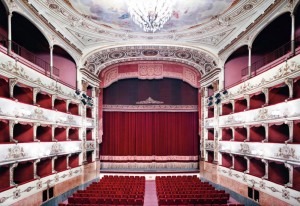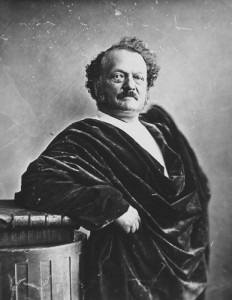
Alessandro Lanari
Credit: http://www.fondazionelanari.it/
Lanari also deserves the prize for running the largest number of theatres between 1820 and 1850: Milan’s La Scala, Venice’s La Fenice, Naples’ San Carlo, Florence’s La Pergola plus the theatres of Verona, Mantua, Faenza, Padua, Arezzo, Ancona, Lucca, Senigaglia; and the list goes on. In an era when the country was crazy about opera, Lanari controlled more theatres than anyone else.
Born in a small town in the Marches region, he started early as an impresario of smaller stages until he moved to Florence where he took over not only the management of the main theatre, La Pergola, but also acquired a costume workshop. With painstaking attention to detail, deciding down to the number of sequins sewn on to dresses, Lanari built a major tailoring business, supplying costumes for rental and sale to theatres all over Italy and employing over 30 staff.

La Pergola Florence
Credit: http://www.musicusconcentus.com/
Controlling stages, artists and costumes put him in an unprecedented position of strength in Europe’s opera scene.
A notoriously tight-fisted micro-manager, his detractors called him an “avaricious pirate,” his powers of conviction were well known. He himself reported how he dealt with a famously lazy and unreliable baritone: “I’ve threatened him. I’ve caressed him. I’ve kissed him….I’ve played all kinds of tricks and I’ve managed against his will to make him sing this part exceedingly well…”
Eccentric as all impresarios, Lanari was known to receive visitors while soaking in his regular baths where he tried to ease the pain from kidney stones. Gilbert Duprez wrote that this provided the perfect venue for fee negotiations: “What? HOW much do you want for that season? How DARE you ask that from me? Can’t you see what condition I am in???!!!”

Gilbert Duprez
Credit: http://www.collectorebooks.com/
Lanari is often referred to by researchers as the perfect impresario, as he possessed the entrepreneurial spirit, artistic finesse, commitment to high productions values (stage sets and of course costumes), as well as the commensurate oversized personality. Unlike his nearly illiterate competitor Barbaja, Lanari left behind an enormous archive of correspondence, currently housed in the Central Library of Florence. No surprise, his contemporaries often referred to him as the “God among Impresarios.”
Donizetti : Lucia di Lammermoor
